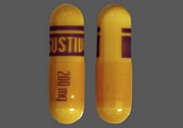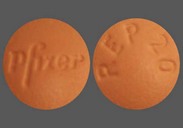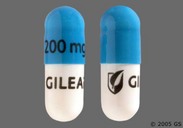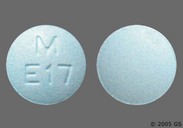E
Drug Class:
Precautions and Contraindications
Active uveal inflammation, angle-closure glaucoma, hypersensitivity to echothiophate products
Dental Considerations
General:
• Determine why patient is taking the drug.
• Avoid drugs with anticholinergic activity, such as antihistamines, opioids, benzodiazepines, propantheline, atropine, and scopolamine.
• Avoid dental light in patient’s eyes; offer dark glasses for patient comfort.
• Question glaucoma patient about compliance with prescribed drug regimen.
Drug Class:
Drug Class:
Mechanism of Action
Therapeutic Effect: Interrupts HIV replication, slowing the progression of HIV infection.
Dental Considerations
General:
• Examine for oral manifestations of opportunistic infection.
• Monitor vital signs at every appointment because of cardiovascular and respiratory side effects.
• Consider semisupine chair position for patient comfort because of GI side effects of drug.
• Assess salivary flow as a factor in caries, periodontal disease, and candidiasis.
• Short appointments and a stress-reduction protocol may be required for anxious patients.
Drug Class:
Serious Reactions
! Cardiac reactions (including ischemia, coronary artery vasospasm and MI) and noncardiac vasospasm-related reactions (such as hemorrhage and CVA) occur rarely, particularly in patients with hypertension, diabetes, or a strong family history of coronary artery disease; obese patients; smokers; males older than 40 yr; and postmenopausal women.
Dental Considerations
General:
• This is an acute-use drug; it is doubtful that patients will seek dental treatment during acute migraine attacks.
• Be aware of the patient’s disease, its severity and its frequency, when known.
• Monitor vital signs at every appointment because of cardiovascular side effects.
• Assess salivary flow as a factor in caries, periodontal disease, and candidiasis.
• Consider semisupine chair position for patient comfort if GI side effects occur.
Drug Class:
Mechanism of Action
Therapeutic Effect: Relieves ocular itching associated with allergic conjunctivitis.
Drug Class:
Antiviral, nucleoside reverse transcriptase inhibitor
Mechanism of Action
Therapeutic Effect: Interrupts HIV replication, slowing the progression of HIV infection.
Uses
Treatment of HIV-1 infection in adults; used in combination with other antiretroviral medications
emtricitabine + rilpivirine + tenofovir disoproxil
em-tri-site′-uh-been, ril-pi-vir′- een, & te noe fo veer
Drug Class:
Serious Reactions
! Lactic acidosis and severe hepatomegaly have been reported with nucleoside analogues (e.g., tenofovir), including fatal cases. Safety and efficacy during coinfection of HIV and HBV have not been established; acute, severe exacerbations of HBV have been reported following discontinuation of antiretroviral therapy.
enalapril maleate
(Alphapril[aus], Amprace[aus], Apo-Enalapril[can], Auspril[aus], Renitec[aus], Vasotec)
Do not confuse enalapril with Anafranil, Eldepryl, or ramipril.
Drug Class:
Angiotensin-converting enzyme (ACE) inhibitor
Indications and Dosages
Serious Reactions
! Excessive hypotension (“first-dose syncope”) may occur in patients with CHF and in those who are severely salt or volume depleted.
! Angioedema (swelling of face, lips) and hyperkalemia occur rarely.
! Agranulocytosis and neutropenia may be noted in patients with collagen vascular diseases, including scleroderma and systemic lupus erythematosus and impaired renal function.
! Nephrotic syndrome may be noted in those with history of renal disease.
Dental Considerations
General:
• Monitor vital signs at every appointment because of cardiovascular side effects.
• After supine positioning, have patient sit upright for at least 2 min before standing to avoid orthostatic hypotension.
• Patients on chronic drug therapy may rarely have symptoms of blood dyscrasias, which can include infection, bleeding, and poor healing.
• Assess salivary flow as a factor in caries, periodontal disease, and candidiasis.
• Limit use of sodium-containing products, such as saline IV fluids, for those patients with a dietary salt restriction.
• Use vasoconstrictors with caution, in low doses and with careful aspiration.
• Stress from dental procedures may compromise cardiovascular function; determine patient risk.
• Short appointments and a stress-reduction protocol may be required for anxious patients.
Consultations:
• Medical consultation may be required to assess patient’s ability to tolerate stress.
• In a patient with symptoms of blood dyscrasias, request a medical consultation for blood studies and postpone dental treatment until normal values are reestablished.
• Take precautions if dental surgery is anticipated and sedation or general anesthesia is required; risk of hypotensive episode.
Stay updated, free dental videos. Join our Telegram channel

VIDEdental - Online dental courses


 Glaucoma
Glaucoma Accommodative Esotropia, Diagnosis
Accommodative Esotropia, Diagnosis Accommodative Esotropia, Treatment
Accommodative Esotropia, Treatment Psoriasis
Psoriasis HIV Infection (in Combination with Other Antiretrovirals)
HIV Infection (in Combination with Other Antiretrovirals)

 Acute Migraine Headache
Acute Migraine Headache Allergic Conjunctivitis
Allergic Conjunctivitis
 HIV Infection (in Combination with Other Antiretrovirals)
HIV Infection (in Combination with Other Antiretrovirals) Dosage in Renal Impairment
Dosage in Renal Impairment HIV
HIV
 Hypertension Alone or in Combination with Other Antihypertensives
Hypertension Alone or in Combination with Other Antihypertensives Adjunctive Therapy for CHF
Adjunctive Therapy for CHF Dosage in Renal Impairment
Dosage in Renal Impairment
 HIV Infection (in combination with other antiretrovirals)
HIV Infection (in combination with other antiretrovirals)